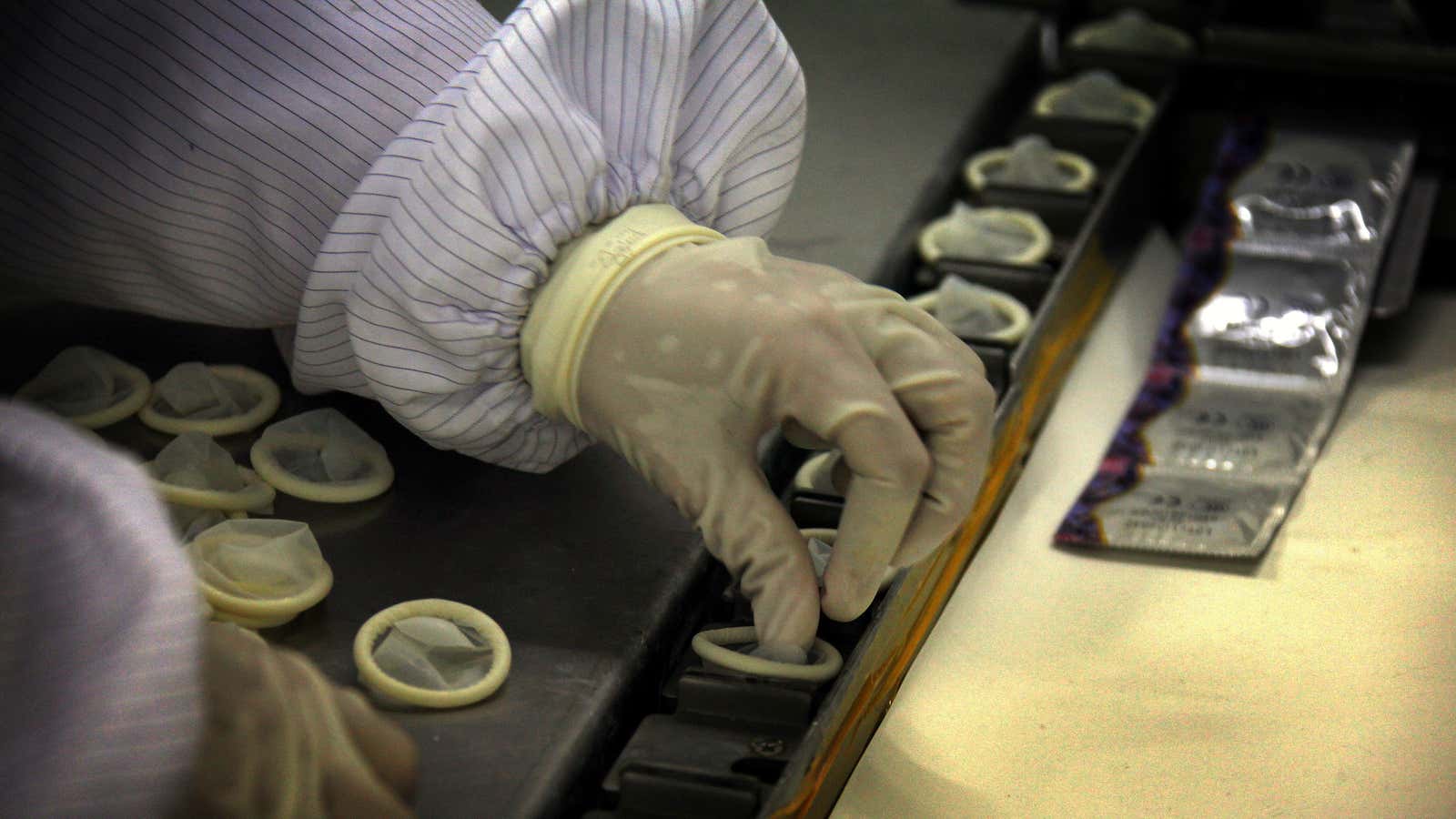Although birth control for women runs the gamut from a range of hormonal pills to implantable devices, options for men are pretty limited. Basically you can use condoms, which a lot of people don’t like, or get a vasectomy, a permanent surgical procedure.
As such, the burden of using birth control falls largely on women. In 2015, over 60% (pdf, p. 6) of women in relationships with men used some kind of birth control themselves. Only 21% (p. 33) of men relied on some form of birth control (which includes the shoddy withdrawal method). This hardly seems fair given that the kind of sex that mandates contraception includes both parties.
Although it seems like scientists have been working on a better male birth control for years to no avail, there actually has been some progress in the field. Scientists from India, led by the biomedical engineer Sujoy Guha at the Indian Institute of Technology, have invented a gel that’s injected into the scrotum that stops sperm from being able to make their way out during sex that has shown to be highly effective at preventing pregnancy. The trouble is, no drug companies want to fund it.
They call it RISUG, for “reversible inhibition of sperm under guidance.” It’s an outpatient procedure that takes about a day of recovery (much like the insertion of an intrauterine device in women), and can be reversed with another injection that dissolves the gel.
Guha, who founded the startup IcubedG Ideas Pvt. Ltd. to begin clinical trials, told the Wire he has tested RISUG in 282 couples who were willing to try it. Despite his 99% success rate—slightly higher than that of condoms—and the fact that the contraceptive market is valued at $19.8 billion, drug companies still won’t touch it.
“The fact that the big companies are run by white, middle-aged males who have the same feeling—that they would never do it—plays a major role,” Herjan Coelingh Bennink, a gynecologist focusing on contraceptives told Bloomberg. “If those companies were run by women, it would be totally different.” Merck and Pfizer, both of which make contraceptives for women, told Quartz that at the moment, they have no plans to look into this kind of male birth control, although they didn’t specify why.
Guha instead has licensed the RISUG technology to the US-based Parsemus Foundation, a nonprofit that focuses on pharmaceutical causes drug companies haven’t picked up. Parsemus has used it to develop Vasalgel, which has worked to stop pregnancies and be reversed in both monkeys and rabbits; human clinical trials are expected to start in 2018.
Other nonprofits have taken stabs at reversible birth control for men. Late last year, researchers published results from a clinical trial funded by the Bill and Melinda Gates Foundation on a hormonal injection for men. It worked about as well as the hormonal pill does for women. However, the trial was terminated because of adverse side effects (which were no worse than those some women encounter with the pill). The advantage of Vasalgel or other RISUG injections is that they’re non-hormonal, with seemingly low side effects so far—although more trials still need to be done.
One thing that’s for sure is these trials won’t take place unless drug companies finance the endeavor. “Whether it’s medical device or pharmaceutical development, it’s very expensive, takes a long time, and is extremely risky in that it can be a total failure at any moment,” says Aaron Hamlin, the executive director of the Male Contraception Initiative. Some estimates project that it costs about $2.6 billion to bring a drug from the research stage to clinical trials market, although that number can vary.
In the case of a male birth control, costs are likely to be on the higher end, too. “Because you’re dealing with an otherwise healthy population that doesn’t face the physical risk of pregnancy, this raises the standard for safety to a higher bar as well,” Hamlin says.
Parsemus takes donations to help fund their work. If drug companies aren’t willing to foot the bill, perhaps donors will.
